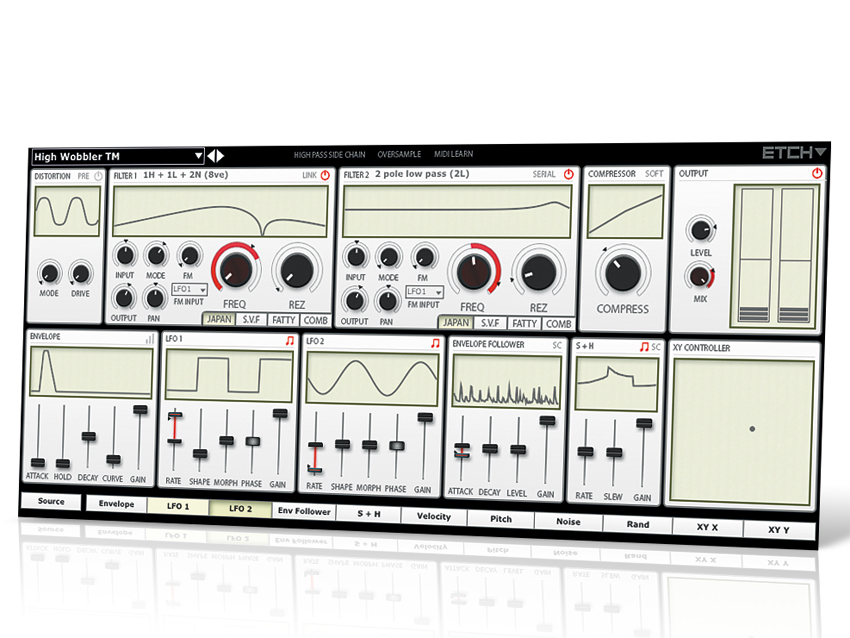MusicRadar Verdict
Etch immediately takes its place at the top table of filter plug-ins. If you care about filtering, you simply have to try it.
Pros
- +
Great sound; loads of filter types; distortion and compression; TransMod and performance MIDI input; brilliant visual feedback.
Cons
- -
Relatively high CPU overhead; no real control over Compressor module.
MusicRadar's got your back
Following in the footsteps of Synth Squad and Tremor, FXpansion's third DCAM (Discrete Component Analogue Modelling) release is a VST/AU/RTAS dual filter featuring the powerful TransMod modulation system.
Etch's signal path starts with a waveshaping distortion unit, switchable between pre- and post-filter operation and featuring six shaping modes (Diode, OTA, Half-rectifier, etc). These can be used to ingrain anything from gentle warming through moderate dirt to total decimation.
"Etch sounds fantastic, with all the analogue bite, fluidity and energy we've come to expect from the DCAM marque."
Next come two identical resonant filters, capable of self-oscillation, operable in series or parallel, with Pan controls enabling split stereo filtering in the latter mode. Analogue-style audio rate FM can also be dialled in if you fancy it. LFOs 1 and 2 (which can run as fast as 1024Hz), the audio input and the sidechain are available as sources.
A selection of four filter models is available: three of them - Japan, SVF and Fatty - emulating a trio of classic hardware models, the fourth a comb filter. Each filter type has its own array of modes (high-pass, low-pass, 2-pole, 4-pole, etc), Japan boasting a particularly rich variety of single and combination pole/type set-ups, and being the most creative of the three regular types - it's well suited to wild, crazy sweeps and effects.
SVF and Fatty, meanwhile, are more about fatness, depth and warmth - for when you're also looking to add tonal character and bite - and the comb filter is great for weird phasing-, flanging- and resonator-style effects.
The final two stages are a Compressor (featuring a choice of Soft or Hard knee) and the Output, where the level and dry/wet mix are set.
MIDI control
There's so much MIDI going on with Etch, you could almost consider it an instrument. There's your regular MIDI Learn mode, with which MIDI CCs can be quickly assigned to all parameters and TransMod depth, as well as MIDI TransMod sources that we'll come onto shortly; but various other functions can also be controlled by MIDI note input (the required routing for which is host-dependant).
Want all the hottest music and gear news, reviews, deals, features and more, direct to your inbox? Sign up here.
The envelope module, for example, is triggered by note C#-2 on MIDI channel 1 and all notes on channels 2 and 3. The reason for the latter is that Filter 1 and 2's cutoff frequencies track note pitch on those two channels, enabling 'pitched', envelope-controlled filtering from the keyboard. The LFOs also get in on the MIDI note action, with specific notes retriggering them and setting their rates.
Etch is insanely modulatable within its own architecture, but the inclusion of playable MIDI note input is a huge bonus.
Trans phat
FXpansion's TransMod system enables ten modulation sources to be assigned to pretty much anything, including their own and each other's parameters. Click a source, then drag the outer ring of the target knob (or the 'track' of a fader) to set the modulation depth.
Sources include two LFOs, a MIDI-triggered envelope, an envelope follower (with sidechain input), MIDI-triggered Random values, and an XY pad. Whether you're working on a synced dubstep b-line or a slowly evolving ambient dreamscape, Etch is well equipped to give you exactly the movement you need.
The sources are animated too, so you can easily see their movement, and the destination controls have moving indicators to show their modulated position.
Etch sounds fantastic, with all the analogue bite, fluidity and energy we've come to expect from the DCAM marque. If you need it, there's an oversampling 'HQ' mode too, although this will up the not-inconsiderable CPU hit even further.
The dual filter design makes Etch incredibly flexible, and the four filter types and their many, many modes deliver an extraordinary range of flavours. The distortion and compression are both well up to scratch sonically (although a bit more control over the Compressor wouldn't hurt).
The TransMod system makes deep modulation almost too easy, and the MIDI input options bring true playability to the table.
Dance and urban producers looking for straightforward, powerful filtering of basslines, breakdowns, vocals and pads will love Etch's Fatty and SVF filter types, while sound designers will find endless succour in the insane shapes of the Japan and Comb types and the limitless TransMod playground. Etch-ellent stuff!
Computer Music magazine is the world’s best selling publication dedicated solely to making great music with your Mac or PC computer. Each issue it brings its lucky readers the best in cutting-edge tutorials, need-to-know, expert software reviews and even all the tools you actually need to make great music today, courtesy of our legendary CM Plugin Suite.

